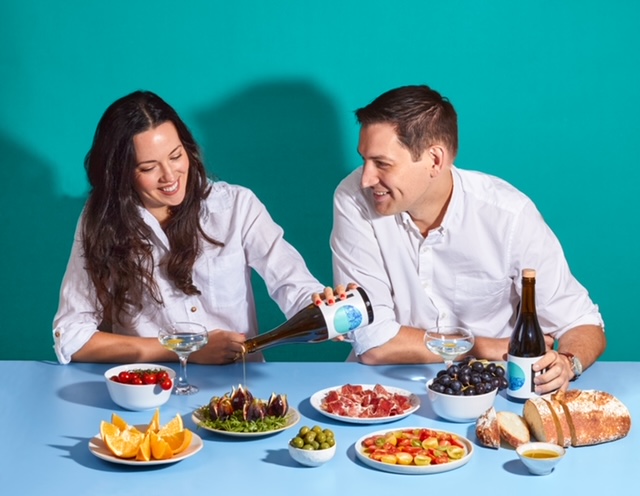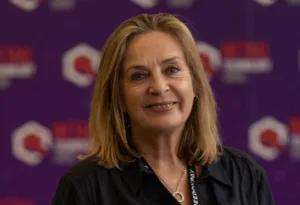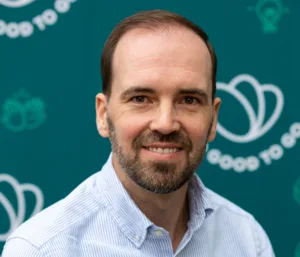Glynn Davis recently spoke with Sarah Vachon, co-founder of Citizens of Soil, about her company’s successful DTC subscrition model…
Can you tell us a little about Citizens of Soil?
We’re an olive oil brand. We source single estate extra virgin olive oil from women who practice regenerative agriculture in their groves. We make it available in reusable bottles with refill pouches on subscription (—right through your letterbox).
Our flagship product, a Greek extra virgin olive oil from Maria Amargiotaki, tastes like its unique hillside location in the wine region of Crete. More importantly it represents the people that produce it. Packed with polyphenols, it’s fresh and flavourful, with notes of green grass, tomato leaf and a slightly peppery finish.
Transparency is at the heart of our brand. We only work with farmers engaged in soil regeneration and we pay them what they’re worth, so we get access to premium olive oil as it should be: fair, sustainable, and flavourful. Additionally, we’re a 1% for the Planet member with our regular donations going to Kiss The Ground (a soil health NGO). This is all backed up by the Provenance.org blockchain platform.
What were the key drivers for creating the company?
We wanted to help our friends, the Amargiotakis family. Here they were making this delicious oil to a very high standard (as it was made for their own family), but the rest was sold on with set market prices that didn’t reflect the work or quality of the oil. It was getting passed through “middle men” and blended, ultimately losing its flavour, identity and value.
This is because olive oil is a broken system. Most small-batch olive oils never get experienced or appreciated outside of their own families or local areas. They’re sold on commodity markets for less than they’re worth and made into bulk blends, stripping them of their identity, and getting lost in complicated, global supply chains. We wanted to break that chain and get small-batch, single estate products into the hands of people who would appreciate them.
All of our sustainability initiatives, such as pushing for more regenerative farming practices and minimising our waste and impact across the business, also shaped the plan.
What is the opportunity to expand into other foodstuffs?
We see an opportunity in more staples making a statement. Some other pantry items, particularly those like vinegars or honey, which are often made by the same producers as olive oil, seem obvious. However, we’re currently so driven by finding and getting more varieties of extra virgin olive oils into the hands of the people we think would appreciate them that our short-term future is all about that product.
What type of customers do you attract?
We have an incredible subscriber base of Citizens. They’re super engaged and are the type of people who really care where their food comes from. We tend to have a lot of folks who are already buying craft coffee, natural wine, and the sorts of products that talk about terroir, the producers, how it’s made, etcetera. There’s a natural cross-over with those who also care about sustainability, and like our refill model, or value the social and environmental ethos of our business.
Is subscription a large proportion of your sales?
It’s certainly a growing aspect, as well as one that we see as valuable going forward. It lets us be more community-based, while better committing to our farmers since it helps with forecasting at harvest time. To date, we’ve had such minimal churn that it’s been quite positive. We hope to continue building out the refill side of our business through this subscription DTC (Direct to Consumer) model.
As well as selling on your website do you sell via third-parties?
Yes, and we’re fortunate enough to have some of the best independent shops across the UK selling our olive oil. We currently only sell bottles—our 500ml and our magnum at 1.5L—to shops. Our refill pouches are for our subscribers only through our own website.
Can you share some numbers – sales, number of subscribers?
We have a subscriber base of 120-plus who get our olive oil pouches every one-to-two months through the post. We’re also listed in 40-plus retailers, including leaders in their respective spaces like Selfridges, Hedonism Wine, and Top Cuvee. As of this year, we just started working with four Michelin-starred chefs on a circular refill model that we hope to roll-out to more restaurants later this year when we get our next batch of oil.
What challenges have you faced and what elements have you had to adapt?
I think every day has fresh challenges when you’re running your own business, particularly in a pandemic, through Brexit, and while supply chains universally are struggling. There’s a huge list of fails, but we’re small enough that we can be agile. For example, prices and timelines are increasing everywhere—so you really have to be watching the cost of goods, margins, and operations constantly.
We also had lots of snags with packaging, such as refill pouches measured by not fitting through letterboxes properly and our bottling being so poorly done that our labels were ruined. All of this is just extra costs and time that wasn’t planned for. One area of particular importance to me is refining our refill and takeback programme, so we’re doing little tweaks and trying to improve that with each new batch.
What is the greatest opportunity for the business?
We want to turn a commodity into a community. The problem we’re trying to solve is this: extra virgin olive oil is a product that is overly commoditised. This means producers are getting squeezed, the environment suffers, and consumers only get access to blended oils that lack the freshness, flavour, and health benefits of extra virgin olive oil straight from the source. Despite being a permanent fixture in our kitchens, most people can’t name their favourite brand of olive oil—and that’s something we’re determined to change.












